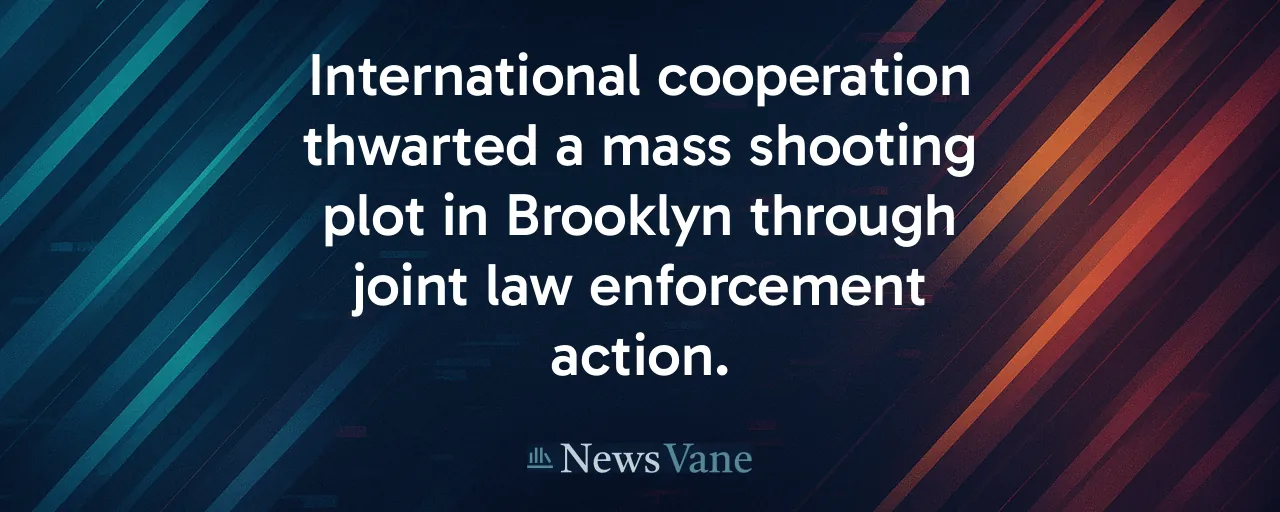A Threat Averted
In September 2024, authorities arrested a 20-year-old Canadian resident planning a mass shooting at a Jewish religious center in Brooklyn. The plot, set to coincide with the first anniversary of the October 7, 2023, Hamas attacks, was disrupted through a seamless collaboration involving New York State Police, the FBI, U.S. Customs and Border Protection, and Canadian law enforcement. The suspect now faces federal charges after being apprehended just before entering the U.S.
For Brooklyn's Jewish community, the news brought relief but also unease. The incident reflected a broader surge in antisemitic threats worldwide, indicating a pervasive pattern rather than an isolated scare. The incident prompts a closer look at how nations and communities work together to keep people safe while grappling with the roots of hate.
What makes this case stand out is the teamwork behind it. From local officers to international partners, the arrest shows what's possible when agencies align. Yet it also raises questions about the tools, policies, and values needed to stay ahead of such threats.
Strength in Unity
The Brooklyn operation hinged on the FBI's Joint Terrorism Task Force, with New York State Police tracking the suspect's movements across borders. By sharing intelligence with Canadian authorities, the team ensured a swift arrest. This kind of global cooperation is increasingly critical in a world where threats move as fast as information.
Recent efforts back this up. In 2024, INTERPOL's Operation Neptune VI linked 14 nations, yielding 66 arrests and major seizures through real-time data exchange. In West Africa, German-funded programs have quadrupled biometric submissions to INTERPOL databases, catching fugitives and disrupting networks. These wins highlight the value of shared technology and training.
Still, hurdles persist. Differing legal standards and limited funding can slow progress. The Brooklyn case worked because of trust and resources, but not every region has those in place. Building consistent, sustainable systems is essential to replicate this success globally.
The Rising Tide of Hate
The Brooklyn plot fits a troubling pattern. Antisemitic incidents soared 340 percent globally in 2024 compared to 2022, with the U.S. seeing 9,354 cases, a five-year high. From a deadly Washington embassy shooting in May 2025 to synagogue attacks in France and Australia, hate-driven violence is escalating.
The Israel-Hamas conflict has intensified these trends. U.S. hate crimes against Jews spiked 337 percent after October 2023, fueled by online propaganda blending jihadist and white-supremacist rhetoric. Extremists exploit encrypted apps, making lone-actor plots like Brooklyn's harder to detect.
Behind the statistics are real fears. Families hesitate to attend services, and students face harassment on campuses. The Brooklyn suspect's choice of a symbolic date shows how global events can spark local violence, underscoring the need for vigilance and community engagement.
Security Meets Solutions
New York responded to the threat with a $13 million boost to northern border security, adding staff and tools to track transnational threats. Some leaders stress tougher vetting and federal-state partnerships, citing the suspect's border crossing as a warning sign. They see enforcement as the cornerstone of safety.
Others call for a wider lens. Programs under the 2023 National Strategy to Counter Antisemitism fund nonprofit security, interfaith dialogues, and education to prevent radicalization. Community grants and campus safety initiatives aim to protect while building trust across groups.
Both approaches have strengths. The Brooklyn arrest relied on law enforcement, but stopping hate before it festers requires outreach. Online radicalization, amplified by social media, demands tech cooperation and early intervention. Bridging security with community efforts is key to lasting change.
A Path Forward
The Brooklyn victory shows what's at stake. Antisemitism and extremism cross borders, demanding flexible, united responses. Investments in technology, training, and global legal alignment are crucial for keeping pace with evolving threats.
Communities also need support. Programs fostering dialogue between Jewish, Muslim, and immigrant groups can counter division. Law enforcement is vital, but it works best alongside efforts that address hate's causes, from online echo chambers to social isolation.
For New York, this moment is about resolve. It's neighbors watching out, agencies collaborating, and a shared belief in safety. The challenges are steep, but the commitment to face them shines through.
